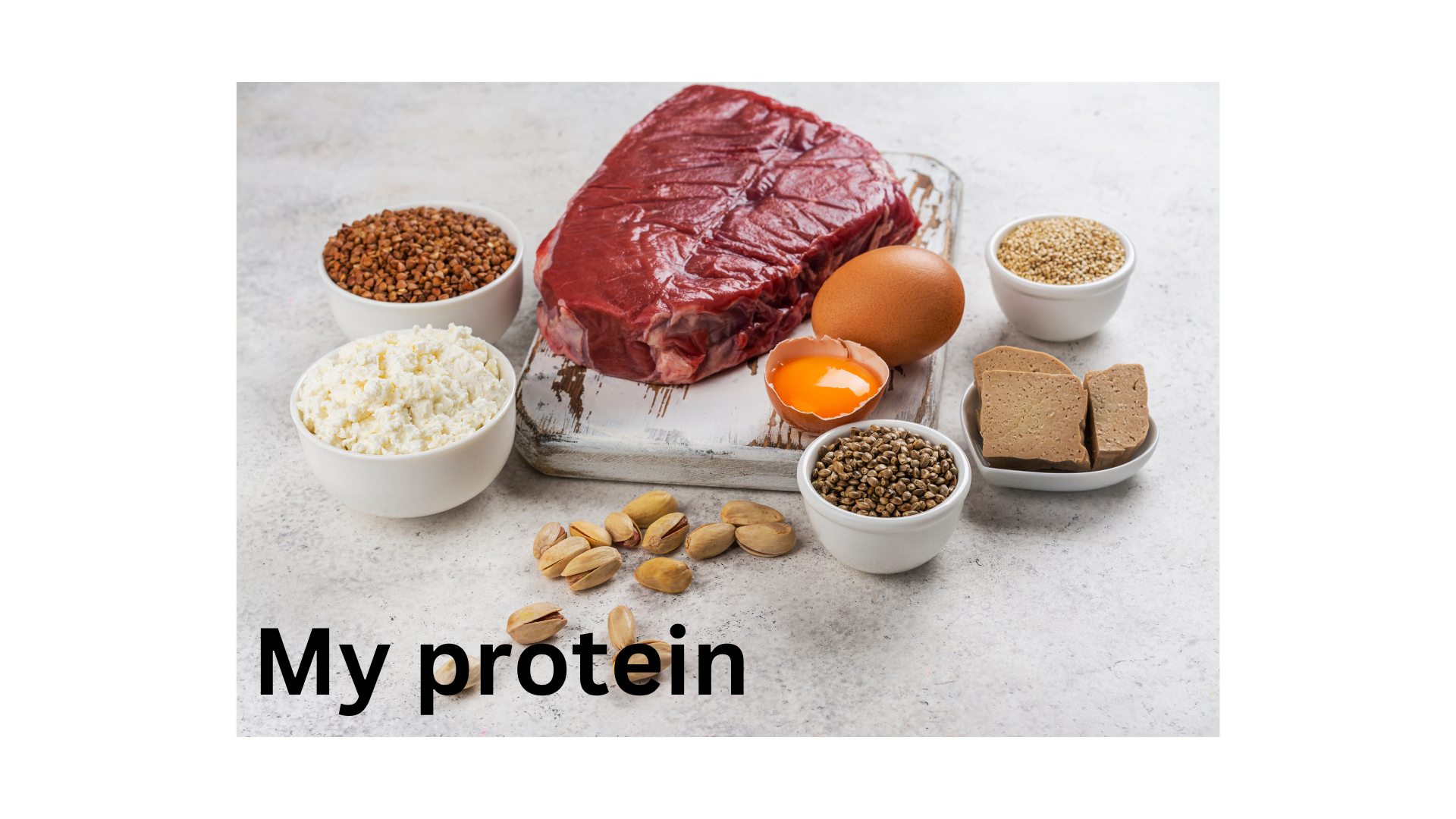Title: Unveiling the Power of Protein: A Comprehensive Guide to My Protein, an essential macronutrient, plays a crucial role in the overall health and well-being of the human body. One particular aspect that has gained significant attention in recent years is the use of protein supplements, with “My Protein” emerging as a popular and reputable brand in the market. In this article, we will delve into the world of protein, exploring its importance, the benefits of My Protein, and how incorporating it into your diet can enhance your fitness journey.



Table of Contents
ToggleThe Significance of my Protein:
Proteins are the building blocks of life, with every cell in the body containing this vital macronutrient. From supporting the immune system to aiding in muscle repair and growth, protein plays a multifaceted role in maintaining optimal health. Consuming an adequate amount of protein is essential for individuals of all ages, especially for those engaged in physical activities such as exercise and sports.
My Protein: An Overview:
My Protein has established itself as a leading brand in the realm of protein supplements, offering a diverse range of products to cater to various dietary preferences and fitness goals. The brand is known for its commitment to quality, using carefully sourced ingredients and employing rigorous testing procedures to ensure the purity and effectiveness of its products.
Key Products and Formulations:
My Protein offers a wide array of protein supplements, each designed to meet specific nutritional needs. Some of their key products include:
- Impact Whey Protein: A popular choice, Impact Whey Protein is known for its high-quality whey protein concentrate, providing a rich source of essential amino acids. This product is versatile and suitable for various fitness goals, including muscle building and recovery.
- Vegan Protein Blend: For those following a plant-based diet, My Protein offers a Vegan Protein Blend, combining pea protein isolate, brown rice protein, and other plant-derived sources to deliver a complete amino acid profile.
- Clear Whey Isolate: Ideal for those seeking a refreshing and clear protein drink, Clear Whey Isolate is a light and fruity alternative to traditional shakes, making it a perfect choice for hydration during workouts.
Benefits of My Protein:
- Muscle Building and Repair: The high-quality protein sources in My Protein supplements contribute to muscle protein synthesis, aiding in the repair and growth of muscle tissues after exercise.
- Convenience and Versatility: My Protein products come in various forms, including powders, bars, and ready-to-drink options, providing convenient choices for individuals with different lifestyles and preferences.
- Quality Assurance: My Protein prioritizes quality control, ensuring that each product undergoes thorough testing to meet the highest standards of purity and effectiveness.
Incorporating My Protein into Your Diet:
To maximize the benefits of My Protein, it’s essential to incorporate it strategically into your diet. Consider factors such as your fitness goals, dietary preferences, and overall nutritional needs. Whether consumed as a post-workout shake, added to smoothies, or incorporated into recipes, My Protein products offer flexibility in meeting your protein requirements.
Conclusion:
Protein is undeniably a cornerstone of a healthy diet, and My Protein stands out as a reliable and effective brand in the world of protein supplements. By understanding the significance of protein, exploring the diverse range of My Protein products, and incorporating them into your diet, you can embark on a journey toward improved fitness, enhanced muscle health, and overall well-being. Remember to consult with a healthcare or nutrition professional before making significant changes to your dietary regimen.
Title: Exploring the Protein Power of Paneer: How Much Protein Does 100g of Paneer Contain?
Introduction:
Paneer, a versatile and beloved dairy product in Indian cuisine, is a rich source of protein. As a popular ingredient in a variety of dishes, from savory curries to delectable desserts, understanding the nutritional content of paneer is essential for those looking to maintain a balanced and protein-rich diet. In this article, we’ll delve into the protein content of 100 grams of paneer and explore its potential health benefits.
Protein Content in 100g of Paneer:
Paneer is renowned for its high protein content, making it a valuable dietary component, especially for vegetarians and those aiming to boost their protein intake. On average, 100 grams of paneer contains approximately 18 grams of protein. This substantial protein content makes paneer an excellent choice for individuals seeking to meet their daily protein requirements.
The protein in paneer is of high quality, as it provides all essential amino acids needed by the human body. These amino acids play a crucial role in various physiological processes, including muscle repair, immune function, and enzyme production.
Benefits of Paneer’s Protein:
- Muscle Growth and Repair: The protein in paneer contains essential amino acids like leucine, which is known for its role in promoting muscle protein synthesis. Including paneer in your diet can contribute to muscle growth and repair, making it a valuable option for individuals engaged in physical activities or those aiming to build muscle.
- Weight Management: Protein-rich foods, like paneer, can be beneficial for weight management. Protein helps increase satiety, reducing overall calorie intake by promoting a feeling of fullness. This can be particularly advantageous for those looking to control their weight or embark on a weight loss journey.
- Bone Health: Paneer is also a good source of calcium and phosphorus, which are essential for maintaining strong and healthy bones. The combination of protein, calcium, and phosphorus in paneer supports overall bone health, making it a valuable addition to a balanced diet.
- Blood Sugar Regulation: The protein in paneer may contribute to better blood sugar control. Including protein-rich foods in meals can help stabilize blood sugar levels and reduce the risk of insulin spikes, which is beneficial for individuals managing conditions like diabetes.
Conclusion:
In conclusion, paneer stands out as a nutritious and protein-packed food choice. With approximately 18 grams of protein in every 100 grams, paneer offers a range of health benefits, from supporting muscle growth to aiding in weight management and promoting bone health. Incorporating paneer into a well-balanced diet can be a flavorful and satisfying way to meet your protein needs while enjoying the versatility of this beloved dairy product in various culinary.
: How Much Protein Does 100g of Paneer Contain?
Paneer, a versatile and beloved dairy product in Indian cuisine, is a rich source of protein. As a popular ingredient in a variety of dishes, from savory curries to delectable desserts, understanding the nutritional content of paneer is essential for those looking to maintain a balanced and protein-rich diet. In this article, we’ll delve into the protein content of 100 grams of paneer and explore its potential health benefits.
Protein Content in 100g of Paneer:
Paneer is renowned for its high protein content, making it a valuable dietary component, especially for vegetarians and those aiming to boost their protein intake. On average, 100 grams of paneer contains approximately 18 grams of protein. This substantial protein content makes paneer an excellent choice for individuals seeking to meet their daily protein requirements.
The protein in paneer is of high quality, as it provides all essential amino acids needed by the human body. These amino acids play a crucial role in various physiological processes, including muscle repair, immune function, and enzyme production.
Benefits of Paneer’s Protein:
Muscle Growth and Repair: The protein in paneer contains essential amino acids like leucine, which is known for its role in promoting muscle protein synthesis. Including paneer in your diet can contribute to muscle growth and repair, making it a valuable option for individuals engaged in physical activities or those aiming to build muscle.
Weight Management: Protein-rich foods, like paneer, can be beneficial for weight management. Protein helps increase satiety, reducing overall calorie intake by promoting a feeling of fullness. This can be particularly advantageous for those looking to control their weight or embark on a weight loss journey.
Bone Health: Paneer is also a good source of calcium and phosphorus, which are essential for maintaining strong and healthy bones. The combination of protein, calcium, and phosphorus in paneer supports overall bone health, making it a valuable addition to a balanced diet.
Blood Sugar Regulation: The protein in paneer may contribute to better blood sugar control. Including protein-rich foods in meals can help stabilize blood sugar levels and reduce the risk of insulin spikes, which is beneficial for individuals managing conditions like diabetes.
Conclusion:
In conclusion, paneer stands out as a nutritious and protein-packed food choice. With approximately 18 grams of protein in every 100 grams, paneer offers a range of health benefits, from supporting muscle growth to aiding in weight management and promoting bone health. Incorporating paneer into a well-balanced diet can be a flavorful and satisfying way to meet your protein needs while enjoying the versatility of this beloved dairy product in various culinary creations.


hello